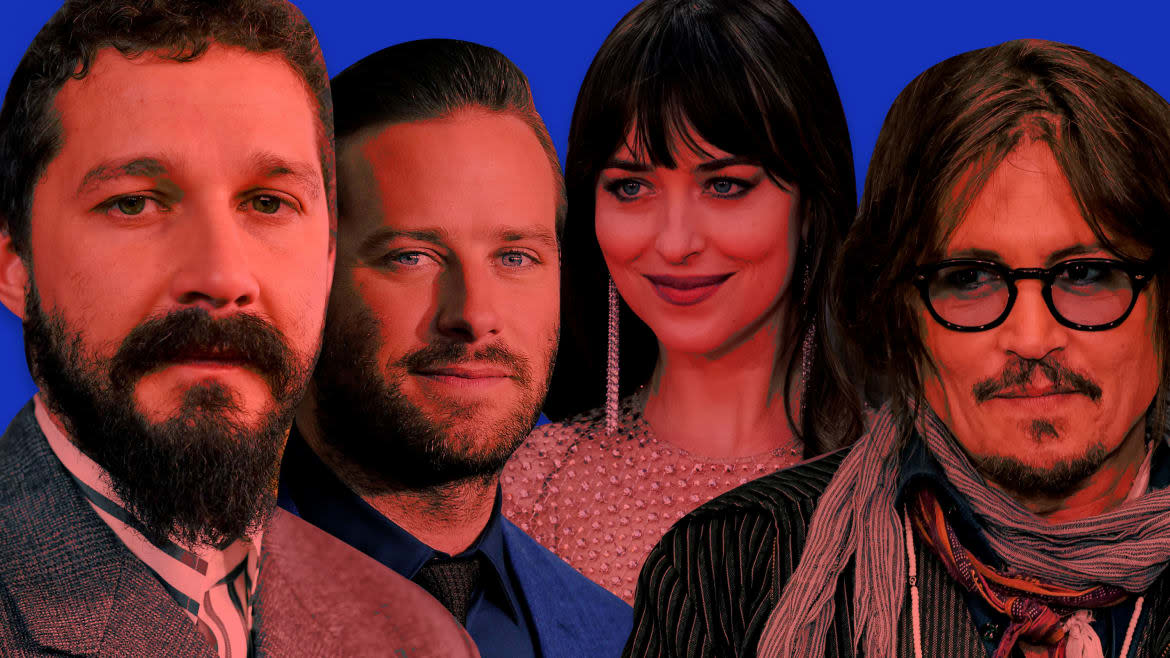Why Dakota Johnson’s ‘Cancel Culture’ Comments Spoke Volumes

- Oops!Something went wrong.Please try again later.
The popular saying goes, “Never meet your heroes.” But maybe a more appropriate piece of advice in today’s political climate is to never ask your heroes what they think about “cancel culture.”
On Wednesday, The Hollywood Reporter released a profile of Fifty Shades of Grey star Dakota Johnson in which she discusses her upcoming role in the Netflix film The Lost Daughter, her journey into acting and her star-studded family tree. At one point, reporter Tatiana Seigel asked about some of her previous male co-stars, specifically Armie Hammer, Johnny Depp and Shia LaBeouf, who have all faced allegations of abusive behavior in the past five years, including rape and domestic violence.
“I never experienced that firsthand from any of those people,” she said. “I had an incredible time working with them; I feel sad for the loss of great artists. I feel sad for people needing help and perhaps not getting it in time. I feel sad for anyone who was harmed or hurt. It’s just really sad.”
Dakota Johnson Didn’t Kill Ellen DeGeneres’ Brand. Ellen Did That Herself.
“I do believe that people can change,” she continued. “I want to believe in the power of a human being to change and evolve and get help and help other people. I think there’s definitely a major overcorrection happening. But I do believe that there’s a way for the pendulum to find the middle. The way that studios have been run up until now, and still now, is behind. It is such an antiquated mindset of what movies should be made, who should be in them, how much people should get paid, what equality and diversity look like. Sometimes the old school needs to be moved out for the new school to come in. But, yeah, cancel culture is such a fucking downer. I hate that term.”
Most people willing to straightforwardly denounce the behavior of those aforementioned actors would say that they hate the term “cancel culture” too, specifically the way it’s been wielded by right-wing pundits, conservative politicians and celebrities of practically all political affiliations to lament social progress and their perceived notions of censorship. Additionally, the perfunctory usage of the term by public figures without any acknowledgement of existing power structures, its origins on the internet or specificity regarding its actual outcomes, has made “cancellation” one of the most infuriating, stagnant topics.
While celebrity reactions to cancel culture have become frequent in the news cycle, Johnson’s remarks about the “loss of great artists” feel particularly ironic considering her beloved status on progressive Twitter thanks to a famous interaction between her and Ellen DeGeneres from 2019 where she confronts the comedian/talk show host about not attending her birthday party on her show. The actress dryly uttering “actually, that’s not true, Ellen” and a screenshot of her leaning forward in her chair have become viral memes and social media shorthand for calling people out on their bullshit. Twitter sleuths also discovered that, on the same weekend of Johnson's birthday party, DeGeneres attended a Dallas Cowboys game where she drew intense backlash for mingling with George W. Bush.
This tidbit, along with the eventual allegations that DeGeneres’ daytime talk show perpetuated a toxic work culture, provided a strangely radical undertone to Johnson’s low-stakes call-out of the media mogul—again, over a birthday party invite—for people who look to celebrities for bare-minimum political messaging. Tweets that Johnson initiated the however brief “takedown” of DeGeneres’s career spread across Twitter. Even as recently as last month, Drew Barrymore applauded Johnson for the viral clip when she appeared on her self-titled talk show.
It’s a common exercise on Twitter for users to project their own beliefs and opinions onto a celebrity’s facial expression or a certain gesture when aimed toward someone they dislike. This kind of wishful thinking can start out as purposely hyperbolic and playful. But when repeated enough times, like in the case of Johnson, it can spark a public narrative that is frankly unearned.
Likewise, to describe Johnson’s comments as disappointing is to assume that she’s given her fans a reason to think she’s some fierce advocate of justice in the first place. However, her flattening sympathy for perpetrators and survivors of abuse and the fact that she believes her positive experiences with these men, as a well-connected actress, is even worth voicing is another example of why the topic of accountability within the entertainment industry feels like it’s gone nowhere over the past four years since Hollywood’s #MeToo movement. (Also, referring to Armie Hammer as a “great artist,” and his sudden disappearance amid sexual abuse claims as a “loss,” is an egregious statement enough). Maybe the most infuriating part of that quote, though, is that many of the female victims of these men and other abusers in Hollywood are great artists themselves whose opportunities have been hijacked and art has been interfered with because of the suffering they experienced.
With the amount of damning evidence that’s accumulated since the Trump era, we should assume that the majority of celebrities feel the same way as Johnson when it comes to systemic issues that poison their industries and the rest of society. Everyone is fine embracing vague, non-threatening ideas of “change” and “equality,” but no one wants to deal with the costs of getting there.
Get our top stories in your inbox every day. Sign up now!
Daily Beast Membership: Beast Inside goes deeper on the stories that matter to you. Learn more.

